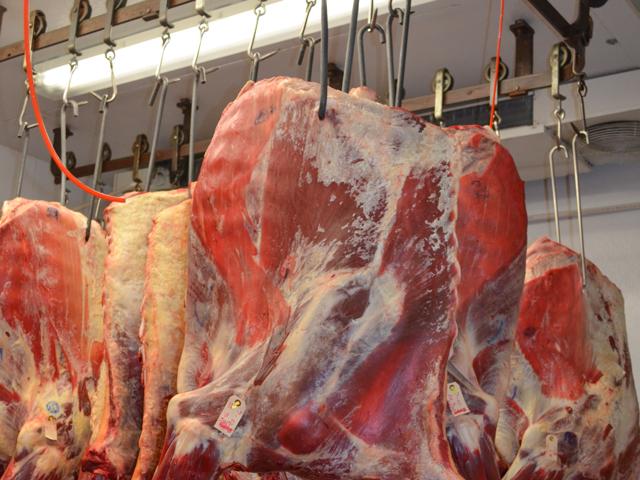Union: COVID a Threat to Food Workers
Frontline Food Workers Express Growing Concern About COVID-19 Outbreaks
OMAHA (DTN) -- JBS USA meatpacking plant employee Antonio Jimenez came down with COVID-19 last year while working at his plant in Worthington, Minnesota.
Nearly a year later, the 26-year JBS employee said he remains concerned for his family and co-workers.
"I don't want anyone else to go through what I went through," he said during a news conference on Tuesday.
"Essential workers like us who keep American fed must be vaccinated. We have struggled throughout the hardest part of the pandemic and I still live in fear. Today, Minnesota cannot afford to go backwards. That is why I'm asking governor (Tim) Walz and JBS to ensure that my co-workers and I get vaccinated as soon as possible. We need our leaders to make sure meatpacking workers are first in line for vaccine access."
Meatpacking plants and grocery store chains continue to battle COVID-19 outbreaks across the country.
Meatpacking companies across the country battled virus outbreaks last spring and plants closed for cleaning and to implement safety measures, leading to a backup in processing livestock. Many farmers were forced to euthanize animals as a result. The ripple effect of packing plants closing also led to record spreads between cash prices paid to producers fed cattle and boxed beef prices that packers receive.
Last week, a congressional subcommittee launched an investigation into COVID-19 outbreaks at meatpacking plants owned by Tyson Foods Inc., JBS USA and Smithfield Foods Inc., as well as the response from the Occupational Health and Safety Administration.
Rep. James E. Clyburn, D-S.C., chairman of the House Select Subcommittee on the Coronavirus Crisis, in a series of letters asked for additional information from executives at the three companies, as well as from OSHA Deputy Assistant Secretary James Frederick.
Using the Defense Production Act, the Trump administration declared meatpacking plant workers as essential personnel, requiring plants to remain open despite outbreaks.
Jimenez said he still is concerned about going to work.
P[L1] D[0x0] M[300x250] OOP[F] ADUNIT[] T[]
"I was one of the workers who got sick," he said. Jimenez added, "I was out of work for months to recover and I had to worry the whole time about passing the infection to my children, family and friends. Most people I know have at least a couple friends who got COVID in my plant, more than 50% of the other workers in my plant got COVID."
While conditions at his plant have improved, Jimenez said the community continues to be concerned.
"For me personally, I still struggle with effects with symptoms like fatigue," he said.
"I still don't feel full back to normal nearly a year later."
UFCW International President Marc Perrone said during a news conference that slow vaccine distribution has become a threat to workers and the food system. Food workers are not being prioritized for vaccination.
"Today, we have no hard facts regarding how many essential workers have received the vaccine," Perrone said.
"What we do know is this based on our survey, 70% of the essential food workers are ready to take this vaccine today. And what is inexplicable, given the threats and the risks that these central workers face, is the fact that a new report shows only 13 states currently prioritize access for food workers, which puts our food supply at risk."
ESSENTIAL WORKERS
Perrone said a new study from the National Bureau of Economic Research found there is a 55% higher likelihood for essential workers testing positive for COVID-19 than those classified as non-essential.
An estimated 400 frontline food workers nationally have died from the virus and more than 80,000 have been infected or exposed, Perrone said.
"The speed of the infections that we're seeing also has increased over the last 60 days," he said. "In the past two months southern California has had at least 137 grocery store COVID outbreaks with nearly 1,000 grocery store workers that have been infected."
Perrone said based on a recent survey of union members, 91% are concerned about the current state of the COVID-19 pandemic and 57% of those workers are more concerned now than they were 30 to 60 days ago.
"So, given all these facts here's what our position is," he said. "Federal, state and local actors must in fact prioritize essential workers and further delays are unacceptable.
"You know we're not saying that these workers need to be first, but they shouldn't be last either. Our elected leaders -- they must work with us and the food and retail CEOs to ensure that the vaccine is free for all essential workers and that these workers have paid time off to receive each dose they can't stand in line for hours and hours, because they have to be at work, where many of us can be at home."
HAZARD PAY
Perrone said more food workers also should receive hazard pay for hazardous work during the pandemic.
In the past month large cities such as Seattle and Los Angeles joined a growing wave to enact new grocery hazard pay mandates, he said. States including Maryland, New Jersey, New York, Oklahoma, Tennessee, and Virginia have introduced grocery hazard pay measures.
Perrone said he's concerned about a recent wave of new COVID-19 variants.
"We've got new variants from the UK, South Africa and Brazil that make this virus, a greater threat to all of us, and simply put, the threat of this pandemic for essential workers is now worse than it ever has been before," he said.
"Even some of our major food and retail employers like Wal-Mart and others refused to disclose how many deaths or infections that they've had in their stores. Here's what we do know, and I have to tell you that we believe these numbers are vastly underestimated because they don't include the non-union workers."
Todd Neeley can be reached at todd.neeley@dtn.com
Follow him on Twitter @toddneeleyDTN
(c) Copyright 2021 DTN, LLC. All rights reserved.






